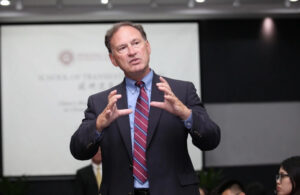by WorldTribune Staff, July 6, 2021
Sitting U.S. Supreme Court Justice Samuel Alito in 2016 spent a “week in residence” at Peking University, a law school in China “headed by a former Chinese Communist Party spy agency leader,” a new report reveals.

“Financial supporters of Peking University’s School of Transnational Law (STL) also include Thomson Reuters and the China-United States Exchange Foundation (CUSEF) – the leading influence group in the Chinese Communist Party’s United Front propaganda outfit,” Natalie Winters at the National Pulse reported July 4. The school is located in Shenzhen, Guangdong, China.
Shockingly, Alito is not the only justice to trek to the university while serving on the High Court.
Now-retired Justice Anthony Kennedy “delivered the keynote address for the school’s opening in 2008 alongside Tung Chee-Hwa, the founder of CUSEF and Vice-Chairman of the ‘highest-ranking entity overseeing’ China’s United Front,” Winters reports.
The facts are confirmed by various U.S. law professors boasting of their collaboration with Chinese communism. The Federalist Society bio for John S. Baker Jr., “Professor Emeritus, Paul M. Hebert Law Center, Louisiana State University,” touts his Peking University connection in the very first sentence:
Dr. John Baker is a Visiting Professor at The Center for the Constitution, Georgetown Law School and Visiting Professor at Peking University School of Transnational Law.
Further down, Baker lists working alongside Alito in China:
He argues in federal court, including two oral arguments in the U.S. Supreme Court. For years, he taught courses for the Federalist Society on separation of powers with the late Supreme Court Justice Antonin Scalia. In September, 2016, he taught a Supreme Court seminar in China with Justice Samuel Alito.
An Oct. 7, 2008 article in the Cornell Chronicle, the in-house weekly newspaper for Cornell University, played up “Cornell Law School” sending a “contingent to East Asia”:
Cornell Law School Allan R. Tessler Dean Stewart J. Schwab and three professors from the school will attend four international conferences in Tokyo, Shanghai, Beijing and Hong Kong, respectively, during a two-week trip later this month. Alumni receptions and individual meetings with alumni and academic and business leaders are scheduled in each city.
Justice Kennedy’s Peking University christening was on the agenda. And with good reason, based on who was to be heading the new school:
The group, which also will include Jack G. Clarke, LL.B. ’52, the benefactor of the Clarke Program, also will attend the inauguration of the Peking University School of Transnational Law in Shenzhen, a new institution led by Jeffrey S. Lehman, Cornell’s former president. Schwab has been invited to speak at the inauguration, as has U.S. Supreme Court Justice Anthony Kennedy.
In 2011, Lehman was an honored recipient of the People’s Republic of China Friendship Award, “the country’s highest award for ‘foreign experts who have made outstanding contributions to the country’s economic and social progress,'” a jubilant Cornell Chronicle detailed.
A June 1 article in The Epoch Times notes that Cornell is facing blowback today for its continued close relationship with Peking University:
Cornell University is moving forward with a proposed dual-degree program between its prestigious hotel school and China’s Peking University (PKU), despite calls to reconsider partnering with a state-run institution that has a poor record of academic freedom and human rights.
The proposed two-year graduate program, designed for executive professionals residing in China, would allow participants to obtain a master’s degree in hospitality management from Cornell’s School of Hotel Administration, and a master’s degree in business administration from PKU’s Guanghua School of Management.
The Epoch Times detailed how Peking University is utilized by the regime to crack down on dissent:
Once a hotbed of the nationwide pro-democracy protests in 1989, PKU is now more than willing to discipline faculty and students whose ideologies aren’t aligned closely enough with the interests of the Chinese communist regime. In 2019, a campus Marxist society was suspended, with some of its members detained, after they tried to help factory workers unionize to improve harsh working conditions. PKU amended its charter following the incident, effectively handing ultimate control over the university’s academic and administrative affairs to the Chinese Communist Party (CCP).
None of this appeared to disturb Cornell officials. “Cornell has a long history of working with academic partners around the world,” Cornell Provost Michael I. Kotlikoff was quoted as saying. “These collaborations are vital to our mission of teaching, discovery, and engagement, and we encourage responsible collaborations even in countries with which we might have fundamental disagreements.”
Peking University personnel are to be found on U.S. campuses today. Julia Qin is a Professor of Law at Wayne State University in Detroit. “She is also a research associate at Peking University International Law Institute,” her WSU bio reads.
Her bio also states that she was cited by Justice Alito in one of his official Supreme Court rulings:
Her article, “WTO Regulation of Subsidies to State-owned Enterprises (SOEs)” in the Journal of international Economic Law, was cited by U.S. Supreme Court Justice Samuel Alito in his dissent opinion in United Haulers Assn. Inc. v. Oneida-Herkimer Solid Waste Mgmt. Auth., 550 U.S. 330 (2007).
The National Pulse’s Winters highlighted the dangers inherent in this China canoodling within the highest ranks of the judicial and academic U.S. legal world:
According to the U.S.-China Economic and Security Review Commission, the United Front seeks to “neutralize sources of potential opposition to the policies and authority of its ruling Chinese Communist Party” and “influence foreign governments and other actors to take actions or adopt positions supportive of Beijing’s preferred policies.”
Americans have every reason to be fully alarmed as they continue to learn more and more about how closely tied their ruling institutions are to a burgeoning communist superpower that is constantly seeking to expand.
INFORMATION WORLD WAR: How We Win . . . . Executive Intelligence Brief
